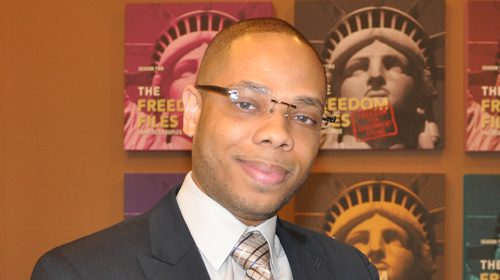
Just months into my second year of law school at the University of Michigan, I witnessed my rights and life profoundly altered because of the passage of Proposal 2. This law banned Michigan’s institutions of higher learning from considering race as one of many factors in admissions, even though these programs had already been approved by the U.S. Supreme Court.
Rapidly understanding the burdensome effects that Proposal 2 would have on me personally and the minority pipeline to law school and other professional schools, I became the lead plaintiff in the ACLU and NAACP Legal Defense Fund case contesting the constitutionality of Proposal 2.
Upon its passage, I knew that Proposal 2 banned our institutions of higher learning from considering race as one of many factors in admissions. However, while I understood Proposal 2 in theory, it would take me some time to understand the full extent of its consequences—the steady decline of students of color enrolled at the university; the marginalization I would feel on campus; and the unfair burden that would be placed on me and other students and faculty, who sought to have race considered as one of many factors in university admissions.
At the core of this burden is the fact that, right now at public universities across Michigan, donors, athletic officials, religious organizations, and alumni have unfettered access to admissions committees and the Board of Regents to advocate that a university include their constituents in admissions decisions. However, racial and ethnic minorities, and those who support greater diversity on campus, have to amend the Michigan Constitution before they can have the same access.
Having attended the University of Michigan for my undergraduate studies and law school, I understand quite well the importance of diversity in the classroom. When engaged in group discussions—which constituted the core method of learning and exchange in my social science curriculum—diversity of all kinds—whether racial, gender, economic, or other—often contributed to a livelier and more profound treatment of the subject matter being studied. Students’ backgrounds and life experiences influenced questions, opinions, and analyses. Race, naturally, was one significant factor out of many that my peers used to frame their understanding of the world.
Undoubtedly, I developed stronger reasoning and analytical skills by being presented with views from peers who neither looked like me nor shared my views on inequality, privilege, or the status of racial minorities in American culture.
As many students of color can attest, being the sole minority student in a class, or one of a very small number, adds pressure to one’s discourse during group discussions. Instead of my opinions being solely my own, I felt at times that my voice in the class represented a larger community, whether that of African-Americans or people of color generally. Greater diversity in the classroom would reduce such pressures and would provide minority students a greater freedom in expressing their individual views rather than feeling obliged to speak as a representative voice.
After I graduated law school in 2008, I began to participate in recruitment efforts at my prior employer, a large law firm with a strong commitment to recruiting diverse attorney candidates. I saw firsthand the effect of Proposal 2 on the Michigan legal market. Diversity numbers had dropped at top-tier Michigan law schools, despite such schools’ efforts to foster diverse student bodies and stabilize matriculation rates, and recruitment of minority talent became more challenging.
Having practiced law in Detroit, a city in which the population is more than 80 percent African-American but where lawyers of color represent far less in proportion, the risk that the minority pipeline to the legal profession could become even more fragile is an incredibly real one.
One of the most important things one learns in civics class is that voters have the right to make law through ballot initiatives. That is not in dispute here. But, the electorate, just like the legislature, is not allowed to make unconstitutional laws, and it is the role of our courts to protect against this.
It is incredibly important that the Supreme Court strike down Proposal 2. By doing so, the court would render justice for those who advocate for race-conscious admissions policies, for students who deserve to train in a rigorous and diverse environment that will prepare them for the real world, and for all those who need access to a legal system that understands the unique needs of diverse populations.
Learn more about affirmative action: Sign up for breaking news alerts, , and .

